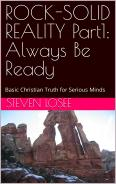"WHAT IS TRUTH?"
When Pilate said that (John 18: 38), he either didn't want to hear the answer or didn't care...or both.
Many years ago I wrote an evangelistic broadside tract with the title "I'll Believe What I Wanna Believe!" The idea had been brewing in my mind ever since a teenager had said, "I don't want somebody to tell me what to believe. I wanna believe what I wanna believe."
The basic message of that tract went something like this:
"A lot of people feel that way these days.
Perhaps you feel that way.
This kind of thinking helps us feel good about ourselves. It helps us feel:
Strong
Intelligent
Independent
Courageous
Strong
and especially
Comfortable.
But there's a problem with that kind of feeling. People who say that are actually saying, "I'm not really interested in what's true, but only in what suits me."
(And frankly, the truth seldom suits us)
It's true that nobody should force you to believe something. But it would be irresponsible to ignore or neglect the One who said:
"I am the Way, the Truth, and the Life. No on comes to the Father except through Me." (John 14:6)
From there, I briefly presented the Gospel and offered a sample "Sinner's Prayer".
Since I wrote that tract, I've noticed that this kind of thinking has become more and more common. At first I only found it in unsaved people who didn't want to believe they were sinners who needed a Savior.
But I recently heard someone express frustration over trying to reason with believers who "think with their emotions'.
After listening and observing, it seems that many Christians believe what they do, not because they are honestly convinced of its truth, but because they want it to be true.
Often people originally become "sold" by an emotional appeal. Others area afraid of being wrong (or their fear of the truth binds them to a lie), or are fiercely determined to be perceived as correct.
Whatever the emotion, the results are the same. Every event, teaching and utterance is re-interpreted until it supports the entrenched belief or is totally discarded. As the computer folks say, "If the data is tortured long enough, it'll confess to anything."
Also, all rational arguments for the truth come up against an emotional brick wall that no amount of reason can dispel.
This is not about people with doctrinal variances based on different interpretations of Scripture. They can come to an understanding, even if they continue to disagree. Thinking with emotions, however, leads to defensiveness, reactions (instead of responses), and often open hostility.
There are even some churches where independent thought is actively discouraged. It's called "rebellion, divisiveness, unspiritual" and other epithets.
Then there are those who refuse to see that their own experiences might not be valid. "But I had this vision...the leader of the Bible study said...the apostle or prophet gave me a word...my dear old Sunday School teacher said..." etc.
This overlaps with "beloved leaders". From charismatics back through Calvinists to Catholics, we find people clinging to errors because it's what they were taught, in spite of what Scripture may or may not support.
I know several people who claim Jesus Christ as Lord who are actually in total subjection to to their own fears. If truth scares them, they avoid it.
They'll use their emotions to keep the rest of us from even discussing these things. They either blow up in anger, weep for sympathy, or leave in a huff. Often they'll be nicer -- they'll actually ask the others to change the subject. The others, wanting to be "nice", usually comply.
Many people who think with their emotions have also learned how to control the behavior of those around them with their reactions.
That's also why many high-profile "ministries" cater to emotions and offer little more than high energy "feel good" messages. they know that's how to attract a loyal following of "emo-thinkers".
But that's another topic.
So what do we do with this?
If I'm one who thinks with emotions, how do I stop? If I'm close to someone who does, how do I confront it?
First of all, Truth and Love should never be seen as contrary to one another.
Second, appropriate the "new heart" God provides. In most cases, this means getting genuinely saved.
Third, we need to take a stand against fear (or whatever emotion has been controlling us and those around us).
Fourth, we need to renounce the things we wanted to hear, and specifically the things we've been involved in that we should have left alone.
At least, that's the view from here.

Comments
Post a Comment